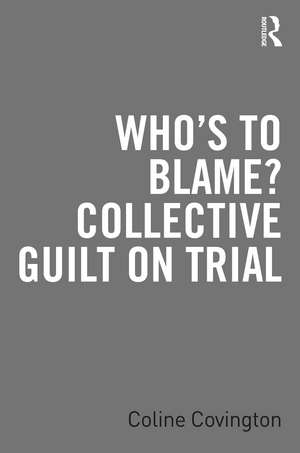Who’s to Blame? Collective Guilt on Trial
Autor Coline Covingtonen Limba Engleză Paperback – 18 mai 2023
Coline Covington explores various aspects of social and collective guilt and considers how both perpetrators and victims make sense of their experiences, with particular reference to group behavior and political morality. Covington challenges the concept of collective guilt associated with the aftermath of large-scale atrocities such as the Holocaust and examines the moral pressure placed on perpetrators to exhibit guilt as part of a realignment of political power and a process of restoring social morality. Who’s to Blame? Collective Guilt on Trial concludes with a chapter-length case study examining Russia’s war in Ukraine.
Combining psychoanalytic ideas with political, philosophical and social theory, Who’s to Blame? Collective Guilt on Trial will be of great value to readers interested in questions of collective guilt, blame and the possibilities of atonement. It will also appeal to psychoanalysts in practice and in training, and to academics of psychoanalytic studies, political philosophy, sociology and conflict resolution.
| Toate formatele și edițiile | Preț | Express |
|---|---|---|
| Paperback (1) | 138.97 lei 22-36 zile | +25.41 lei 5-11 zile |
| Taylor & Francis – 18 mai 2023 | 138.97 lei 22-36 zile | +25.41 lei 5-11 zile |
| Hardback (1) | 840.09 lei 22-36 zile | |
| Taylor & Francis – 18 mai 2023 | 840.09 lei 22-36 zile |
Preț: 138.97 lei
Nou
Puncte Express: 208
Preț estimativ în valută:
26.59€ • 27.61$ • 22.18£
26.59€ • 27.61$ • 22.18£
Carte disponibilă
Livrare economică 03-17 martie
Livrare express 14-20 februarie pentru 35.40 lei
Preluare comenzi: 021 569.72.76
Specificații
ISBN-13: 9781032460789
ISBN-10: 1032460784
Pagini: 172
Dimensiuni: 156 x 234 x 20 mm
Greutate: 0.28 kg
Ediția:1
Editura: Taylor & Francis
Colecția Routledge
Locul publicării:Oxford, United Kingdom
ISBN-10: 1032460784
Pagini: 172
Dimensiuni: 156 x 234 x 20 mm
Greutate: 0.28 kg
Ediția:1
Editura: Taylor & Francis
Colecția Routledge
Locul publicării:Oxford, United Kingdom
Public țintă
General, Postgraduate, Professional Reference, and Undergraduate AdvancedRecenzii
"It takes courage to step into the maelstrom of groups blaming groups. Individual hurts and trauma lead to blame, shame and guilt, but when the large group is involved morality, meaning and transgenerational transmission add fuel to the fire and we are all in danger of getting burnt. This book takes us along a path we need to tread in the cause of survival. It is a book that leaves a lasting message in your mind and I strongly recommend it." - John, Lord Alderdice, FRCPsych, The Changing Character of War Centre, Pembroke College, Oxford.
"We live in an era when individuals pride themselves on their victim status, grievances are carefully nurtured, public apologies are de rigueur and reparations are constantly demanded of the formerly powerful. Covington's book cuts to the chase, subjecting our modern blame culture to forensic examination. She questions whether apologies of this sort make logical, historical or legal sense and what therapeutic emotional value they actually possess. A welcome breath of fresh, bracing air." - Michela Wrong, author of Do Not Disturb: The Story of a Political Murder and a Regime Gone Bad
"In this brilliant study of collective guilt, Coline Covington fuses together the disciplines of history, politics, and psychoanalysis, helping us to understand the profound effects of blame on perpetrators and victims across generations. Her writing is both lucid and learned throughout." - Charles Grant, Director, Centre for European Reform
"We live in an era when individuals pride themselves on their victim status, grievances are carefully nurtured, public apologies are de rigueur and reparations are constantly demanded of the formerly powerful. Covington's book cuts to the chase, subjecting our modern blame culture to forensic examination. She questions whether apologies of this sort make logical, historical or legal sense and what therapeutic emotional value they actually possess. A welcome breath of fresh, bracing air." - Michela Wrong, author of Do Not Disturb: The Story of a Political Murder and a Regime Gone Bad
"In this brilliant study of collective guilt, Coline Covington fuses together the disciplines of history, politics, and psychoanalysis, helping us to understand the profound effects of blame on perpetrators and victims across generations. Her writing is both lucid and learned throughout." - Charles Grant, Director, Centre for European Reform
Cuprins
Dedication
Opening Quote
Acknowledgements
Preface
Introduction
Chapter 1 Who’s to Blame?
Chapter 2 A Tragic Inheritance: The Irresolvable Conflict for Children of Perpetrators
Chapter 3 Collective Guilt – A Moral Imperative?
Chapter 4 Guilt and Shame
Chapter 5 Saving Face: Memory, Identity and Blame
Chapter 6 Rituals of Healing and the Perpetuation of Blame
Chapter 7 The Myth of Closure
Chapter 8 The "Empire of Lies": Russia’s War in Ukraine
Epilogue: Beyond Blame
Opening Quote
Acknowledgements
Preface
Introduction
Chapter 1 Who’s to Blame?
Chapter 2 A Tragic Inheritance: The Irresolvable Conflict for Children of Perpetrators
Chapter 3 Collective Guilt – A Moral Imperative?
Chapter 4 Guilt and Shame
Chapter 5 Saving Face: Memory, Identity and Blame
Chapter 6 Rituals of Healing and the Perpetuation of Blame
Chapter 7 The Myth of Closure
Chapter 8 The "Empire of Lies": Russia’s War in Ukraine
Epilogue: Beyond Blame
Notă biografică
Coline Covington has for many years combined her background in political science and criminology with her psychoanalytic practice and thinking. She is currently a Fellow of International Dialogue Initiative (IDI), a think tank on political conflict. She previously worked as a consultant to local authorities on juvenile justice policy and set up the first victim/offender mediation scheme in the UK with the Metropolitan Police. Who’s to Blame? Collective Guilt on Trial is the third book of a trilogy on political morality.
Descriere
Who’s to Blame? Collective Guilt on Trial presents a psychoanalytic exploration of blame and collective guilt in the aftermath of large-scale atrocities that cause widespread trauma and victimization. It explores aspects of social and collective guilt and considers how both perpetrators and victims make sense of their experiences.
